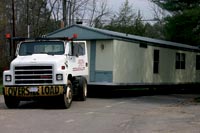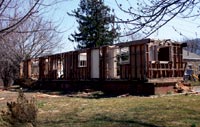Q: Why is a Buncombe County divorce like a tornado?
A: Somebody’s apt to lose a trailer.

Big winds aside, the old joke (substitute your semi-rural county of choice) is truer here than many might suspect: According to Tax Collector Gary Roberts, one-third of all Buncombe County homes are mobiles. And Executive Director Brad Lovin of the N.C. Manufactured Housing Institute told Xpress: “Statewide, manufactured housing makes up about 15 percent of homes, but that figure is higher in rural areas. In some rural counties, it is the predominant form of housing—up to 70 percent.”
After World War II, factories were looking to retool, and there were plenty of workers with experience fashioning frames and wrapping them in metallic skins. Sleek Airstream travel trailers, which first appeared in the 1930s, soon acquired squared-off cousins, and tiny tagalongs grew into stretch versions that sprouted wheels only for a one-way trip from factory to house lot. Meanwhile the baby boom outstripped the availability of stick-built homes, pushing prices skyward. Mobiles helped fill the gap.
There’s no question that a mobile home can provide an affordable, attractive, comfortable, even energy-efficient nest. It’s a handy way to get a roof over your head. But is it worth the real cost? And what about that roof?
High interest, dwindling value

The single best argument for buying a mobile home is the purchase price. Factory assembly creates the lowest production cost of any form of purchased housing, and the benefits are passed along to the buyer. In Asheville, singlewide trailers start at about $30,000 (including delivery and setup) and run to $40,000 or more, depending on the model, amenities and site work, local dealers report. So far, so good.
Next, because mobiles aren’t typically fastened to a foundation, they’re taxed as personal rather than real property. (Manufactured homes—factory-built units designed for permanent installation—become real estate after delivery, according to Roberts.) And if a buyer defaults on a mobile-home loan, the merchandise can be repossessed and rolled away, making it easier for folks with weak credit to get financing.
The flip side, however, is higher interest rates. A review of rates listed online found mobile-home loans not secured by land running at least 6 percent above mortgage loans. That amounts to an extra $20,000 on a $50,000, 10-year note.
Mobiles also resemble vehicles in that they depreciate over time. And together with high interest rates, it means the buyer is paying more for less. A stick-built home could easily double in value over 10 years, whereas a comparably priced mobile may have lost a third or more of its value.
“The taxable value of a mobile home depreciates until it reaches a final base-line value; then it continues to be taxed at that value,” Roberts explains. On the bright side, however, owners don’t face the annual “sticker shock” when the county sends out property-tax bills.
Get thee hence

The same lack of capital, credit and/or income that makes a mobile home an attractive option in the first place often dictates that it be situated on a rented lot. Many mobile owners have found such parks to be great neighborhoods providing most of the advantages of a typical suburban community: friendships for adults and children, adequate parking, garden space and a sense of belonging.
But boom times can make renting in trailer parks a chancey gamble as land values outpace rental income. Last fall, residents of Weaverville’s Mountain Terrace Mobile Home Park received eviction notices. The property under their homes had been sold as part of an 85-acre shopping-center development, and they were given 180 days to vacate.
Residents of the Monticello Mobile Home Park on Cooper Boulevard in West Asheville also faced eviction last year when Wal-Mart announced plans for a new supercenter on the Smokey Park Highway. Community activists made a fuss, and Wal-Mart canceled the project, but in March, those residents again received eviction notices from Asheville Property Management, which owns and/or manages the various parcels that make up the park.
Weaverville First, a community group formed last fall in response to several development issues, has worked to raise funds for Mountain Terrace residents who must move their trailers. After negotiations with Weaverville First, the developer (Harris, Murr & Vermillion), along with Wal-Mart and Lowe’s (both prospective tenants of the new development), have kicked in money to help with the move. A broad coalition of activists and nonprofits is gearing up to provide similar help on Cooper Boulevard.
“The cost to move a home is $3,500 to $4,500, depending on what they need to do to meet code on electric and entrance porches,” says Jody Ochs of Weaverville First.
But cost isn’t the only issue. Although trailers are by definition “mobile,” wheels alone don’t guarantee a parking place. And these days, the same high property values that underlie evictions are more or less evident throughout the county and region. Owners may also run afoul of a Buncombe County ordinance that prohibits relocating mobile homes built before June 14, 1976.
The Mountain Terrace residents were lucky, notes Ochs: “A park owner in Woodfin had just added 35 new sites last year. It is situated near the highway, so we wonder just how long it will take for a developer to swoop in on that one. I think that the residents at Cooper Boulevard are going to have a much more difficult time.”
Mountain Terrace resident Audrey Holcombe said: “The Lord has blessed us: We found a place in Madison County. The only problem I’ve been having is that we have to wait and wait and wait to find out what help we can get. We don’t have that kind of money.”
About that roof
Based on this writer’s 25 years as a building contractor, weather is the main reason trailers depreciate in value. All roofs take a beating from solar heat and UV rays, precipitation, ice and wind. The wood siding on a conventional home may last a century, during which span the roof is resurfaced five or more times. Flat roofs are generally more likely to leak due to puddling, and metal is subject to significant expansion and contraction due to temperature fluctuations. Flat metal roofs eventually leak. Period.
For trailer owners who either own the land beneath the wheels or feel reasonably secure about the duration of their lease, a second roof is the best way to extend their home’s useful life. Sealing the trailer’s metal roof will delay leakage for a while, but a separate roof that can be reshingled or othewise repaired as necessary will be far more effective.
Such preservation is the key to real long-term value. In 10 years or so, a trailer purchased with a loan will have cost more than comparably priced stick-built housing and be worth less, but once it’s paid for, the ongoing costs are likely to be low. Past middle age, a well-kept trailer begins to accumulate use-value as either a primary or secondary residence or a source of rental income, making up for its midlife doldrums.
Taking out the trash
Inadequately roofed trailers, however, are a mess. Once moisture gets into the insulation, a mobile home is essentially uninhabitable and will probably either devolve into a storage container or be abandoned outright. The aluminum siding does have some salvage value, but that leaves a mouldering, rust-prone frame with flags of insulation flapping in the wind.
Abandoned trailers are enough of an eyesore that Buncombe and other counties have started paying to have them removed. Last November, for example, the county signed a $14,220 contract with GQC Trailer Removal to haul off 14 such wrecks.
In sum, trailers are a bargain both up front and down the road, but they’re a poor investment in the midterm, especially when bought on credit. Still, for many who live paycheck to paycheck—a large and growing segment of American society—they remain the most affordable housing choice.


Before you comment
The comments section is here to provide a platform for civil dialogue on the issues we face together as a local community. Xpress is committed to offering this platform for all voices, but when the tone of the discussion gets nasty or strays off topic, we believe many people choose not to participate. Xpress editors are determined to moderate comments to ensure a constructive interchange is maintained. All comments judged not to be in keeping with the spirit of civil discourse will be removed and repeat violators will be banned. See here for our terms of service. Thank you for being part of this effort to promote respectful discussion.